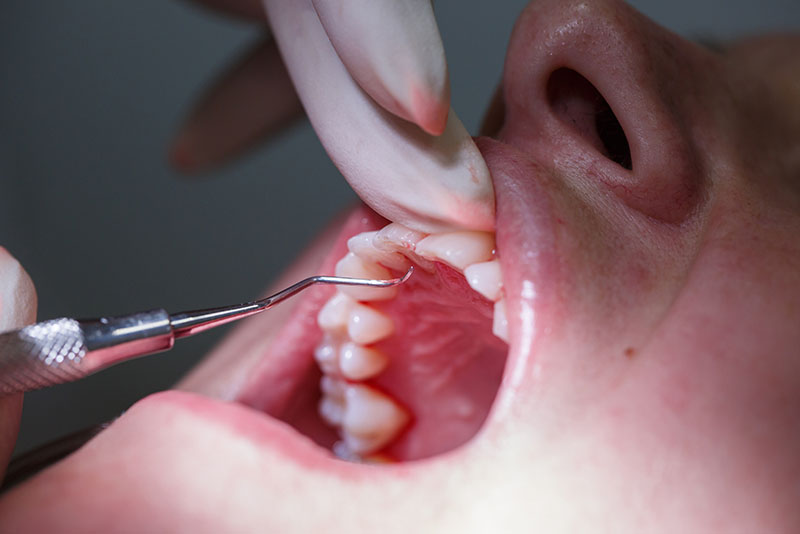While gingivitis is typically not painful, its early detection is vital to prevent it from progressing to more severe gum disease, such as periodontitis. When left untreated, gingivitis can lead to irreversible damage to the supporting structures of the teeth, including the bone.
Regular dental check-ups are essential for early detection. Dentists can identify and diagnose gingivitis based on the symptoms and the presence of plaque and tartar. Early intervention can prevent the condition from worsening and improve your overall oral health.
Treatment Of Gingivitis
The good news is that gingivitis is a reversible condition, and effective treatment options are available. The main goal of treatment is to reduce inflammation and eliminate the factors contributing to gum disease. Here are some common approaches to treating gingivitis:
Improved Oral Hygiene:
· Brushing: Brush your teeth at least twice a day using fluoride toothpaste. Ensure that you brush all surfaces of your teeth, including the front, back, and chewing surfaces. Pay special attention to the gumline.
· Flossing: Floss between your teeth and along the gumline daily to remove plaque and food particles.
· Mouthwash: Antiseptic mouthwashes can help reduce bacteria in the mouth, but they should not be used as a substitute for brushing and flossing.
Professional Dental Cleanings:
· Dentists or dental hygienists can perform professional cleanings to remove tartar, a hardened form of plaque, which cannot be removed by regular brushing and flossing. This is an essential step in the treatment of gingivitis.
Medications:
· In some cases, your dentist may recommend specific antimicrobial mouthwashes or prescription medications to help reduce the bacterial load in your mouth.
Lifestyle Changes:
· Quitting smoking and tobacco use is crucial for improving oral health and preventing gingivitis from worsening.
· Eating a balanced diet rich in fruits and vegetables can provide the nutrients your gums need to stay healthy.
Stress Management:
· High levels of stress can weaken the immune system and increase susceptibility to gum disease. Practicing stress-reduction techniques, such as meditation or yoga, can be beneficial.
- Treatment For Underlying Health Conditions:
- If an underlying medical condition is contributing to gingivitis, managing that condition effectively can help improve your gum health.
Prevention Is Key
Preventing gingivitis is far easier and less costly than treating it. Here are some preventive measures you can adopt:
Maintain A Consistent Oral Care Routine:
· Brush your teeth twice a day with fluoride toothpaste.
· Floss daily to remove plaque and food particles between your teeth.
· Use an antiseptic mouthwash if recommended by your dentist.
Regular Dental Check-Ups:
· Visit your dentist for regular check-ups and professional cleanings.
· Your dentist can detect and address any signs of gingivitis early.
Healthy Diet:
· Consume a diet rich in fruits, vegetables, and whole grains to provide essential nutrients for gum health.
Avoid Tobacco Products:
· Quit smoking and avoid the use of tobacco products, as they significantly increase the risk of gingivitis.
Manage Stress:
· Stress can affect your immune system, so consider stress-reduction techniques to maintain overall health.
Understand Medication Side Effects:
· If you’re on medications that can affect your oral health, discuss potential side effects with your healthcare provider and dentist.
The Role Of Gingivitis In Overall Health
It’s important to recognize that oral health is closely connected to overall health. Gingivitis is not just a concern for your teeth and gums; it can have implications for your whole body. Some studies have shown potential links between gum disease and other health conditions, such as diabetes, heart disease, and respiratory problems. Therefore, taking care of your gums can contribute to your overall well-being.
Conclusion
Gingivitis is a common oral health condition that can have a significant impact on your quality of life if left untreated. Recognizing its symptoms early and seeking appropriate treatment are key steps to maintaining healthy gums and teeth. With a combination of improved oral hygiene, professional dental care, and lifestyle adjustments, you can effectively manage and prevent gingivitis. Don’t underestimate the












